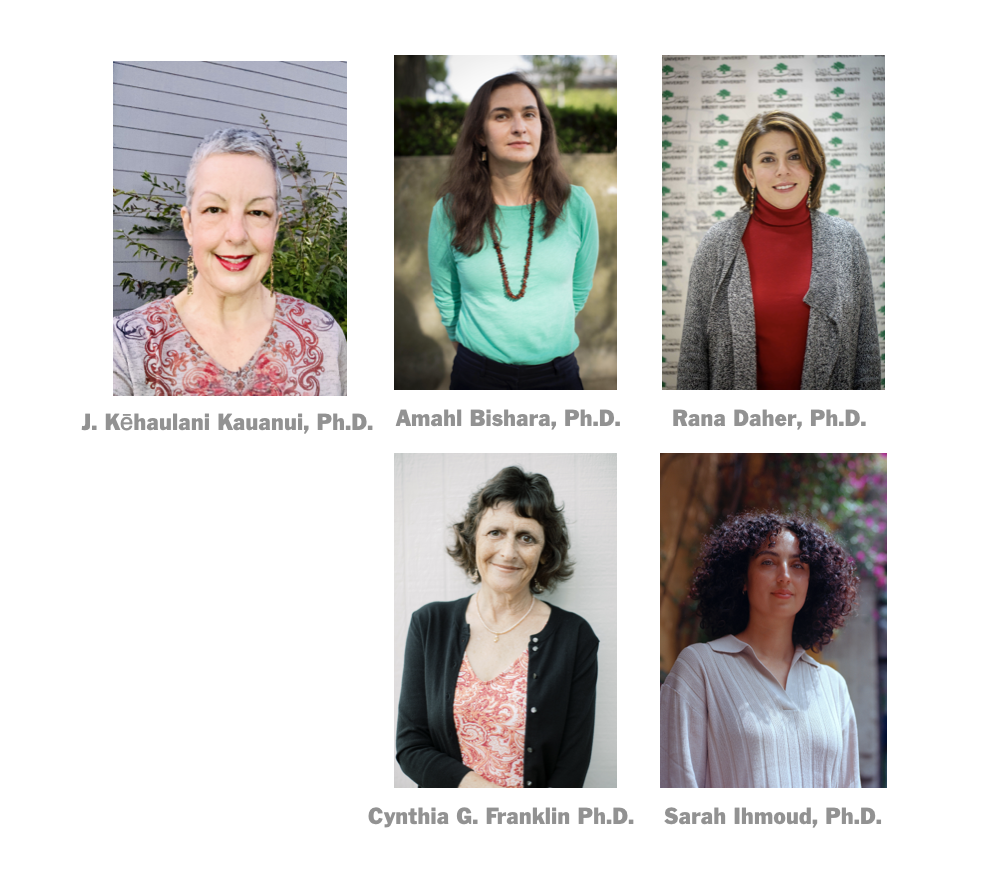This is a Hybrid Event, meaning you can attend virtually via Zoom or, in-person at the Palestine Museum US, 1764 Litchfield Turnpike, Woodbridge, CT, USA. You may register either way and can later change your mode of attendance any time. Doors open at 1:00 PM; the program begins at 2:00 PM US EDT; 9:00 PM Palestine Time.
PALESTINE SOLIDARITY POLITICS: A Round Table Discussion
Sponsored by: Middle East Crisis Committee (CT) and U.S. Campaign for the Academic and Cultural Boycott of Israel
Event Description
This roundtable event addresses multiple dimensions of Palestine solidarity politics that challenge Israeli settler colonialism, occupation, and apartheid. What are the grounds of solidarity with Palestine and the Palestinian people? How does the expression of Palestine solidarity politics articulate to other anti-colonial struggles as well as decolonization and abolition movements? How do we both navigate the attacks on the Boycott, Divestment and Sanctions (BDS) movement while also expanding existing frameworks for transformative justice? Themes for discussion will include: political organizing in the U.S. context given the structural comparisons between and among Indigenous peoples and Palestinians; countering Zionist-imposed fragmentation across the geographies of those living in exile and divided within the geography of Palestine, including ’48 Israel, Gaza, and the West Bank; anti-normalization and the politics of academic and cultural boycott; working within cultural spaces across borders to cultivate and curate opportunities to connect with Palestinian activists, scholars, and artists; and understanding Palestine is a feminist issue.
Event Moderator: J. Kēhaulani Kauanui, Ph.D.
Participant Bios:
J. Kēhaulani Kauanui, Ph.D. is an activist, radio producer, and scholar. She is Professor of American Studies and an affiliate faculty member in Anthropology at Wesleyan University, where she teaches courses related to Indigenous sovereignty, settler colonialism and decolonization. She is the author of Hawaiian Blood: Colonialism and the Politics of Sovereignty and Indigeneity (Duke University Press 2008); Paradoxes of Hawaiian Sovereignty: Land, Sex, and the Colonial Politics of State Nationalism (Duke University Press 2018); and Speaking of Indigenous Politics: Conversations with Activists, Scholars, and Tribal Leaders (University of Minnesota Press 2018). Kauanui is one of the six co-founders of the Native American and Indigenous Studies Association (NAISA). She serves on the advisory board of the U.S. Campaign for the Academic and Cultural Boycott of Israel (USACBI) and has a book project-in- progress provisionally titled “Indigenous Implications: Decolonizing Palestine Solidarity Politics.”
Amahl Bishara, Ph.D. is Associate Professor and Chair of the Anthropology Department at Tufts University. She is the author of Crossing a Line: Laws, Violence, & Roadblocks to Palestinian Political Expression (Stanford 2022), about different conditions of expression for Palestinian citizens of Israel and Palestinians in the West Bank. She also writes about popular refugee politics in the West Bank. Her first book, Back Stories: U.S. News and Palestinian Politics (Stanford University Press 2013), is an ethnography of the production of U.S. news during the second Palestinian Intifada. She is the president of the Middle East Section of the American Anthropological Association.
Cynthia G. Franklin, Ph. D. is Professor of English at the University of Hawai‘i. She coedits thejournal, and is author of (2009) as well as Multi-Genre Anthologies A third book, Narrating Humanity: Life Writing and Movement Politics from Palestine to Mauna Kea, is forthcoming in June 2023 with Fordham University Press. After participating in 2013 in a Faculty Development Seminar on the West Bank with PARC (the Palestinian American Research Center), she coedited a special journal issue of Biography, "Life in Occupied Palestine." For the past 10 years, she has been part of the Organizing Collective of USACBI, the US Academic and Cultural Boycott of Israel. As part of her work for USACBI, she worked on academic boycott initiatives for the American Studies Association and the Modern Language Association, and founded Students and Faculty for Justice in Palestine at the University of Hawai‘i (SFJP@UH).
Rana Daher, Ph.D. is associate professor of history and contemporary Arab studies and Director of the Museum at Birzeit University in Palestine. Her research interests include the history and historiography of colonialism, nationalism, and cultures of resistance. She earned her PhD in history from the University of Chicago and has since published in several venues including the Journal of Palestine Studies, Jerusalem Quarterly, Settler Colonial Studies, and Native American and Indigenous Studies. She has a book-in-progress, Lifta and Resisting the Museumification of Palestine: Indigenous History of the Nakba (contracted with UNC Press), which advances an indigenous understanding of time, space, and memory in Palestine by focusing on the details of the people and place of Lifta village over time. And her second book is also in-progress, The Buraq Revolt: Constructing a History of Resistance in Palestine, which argues that this 1929 revolt was the first sign in the Mandate period of sustained mass resistance to the settler-colonial project, including direct and rhetorical actions against both political Zionism and British imperialism, planting seeds of mass political mobilization.
Sarah Ihmoud, Ph.D. is a Chicana-Palestinian anthropologist whose work uplifts the lived experiences, histories, and political contributions of Palestinian women and Palestinian feminism. Dr. Ihmoud’s scholarship has been published in American Anthropologist, Feminist Anthropology, Cultural Anthropology, Feminist Studies, State Crime Journal, Jerusalem Quarterly and Biography. Her research has been supported by the National Science Foundation, the Palestinian American Research Center (PARC), the Wenner-Gren Foundation for Anthropological Research, and the National Endowment for Humanities. She is a founding member of the Palestinian Feminist Collective and is Assistant Professor of Anthropology at the College of the Holy Cross in Worcester, MA.
**Please note that all speakers plan to appear in-person with the exception of Dr. Daher, who will join us from the West Bank via Zoom.
Palestine Museum US is hosting the program but is not responsible for the content. All opinions expressed are those of the persons expressig them.

